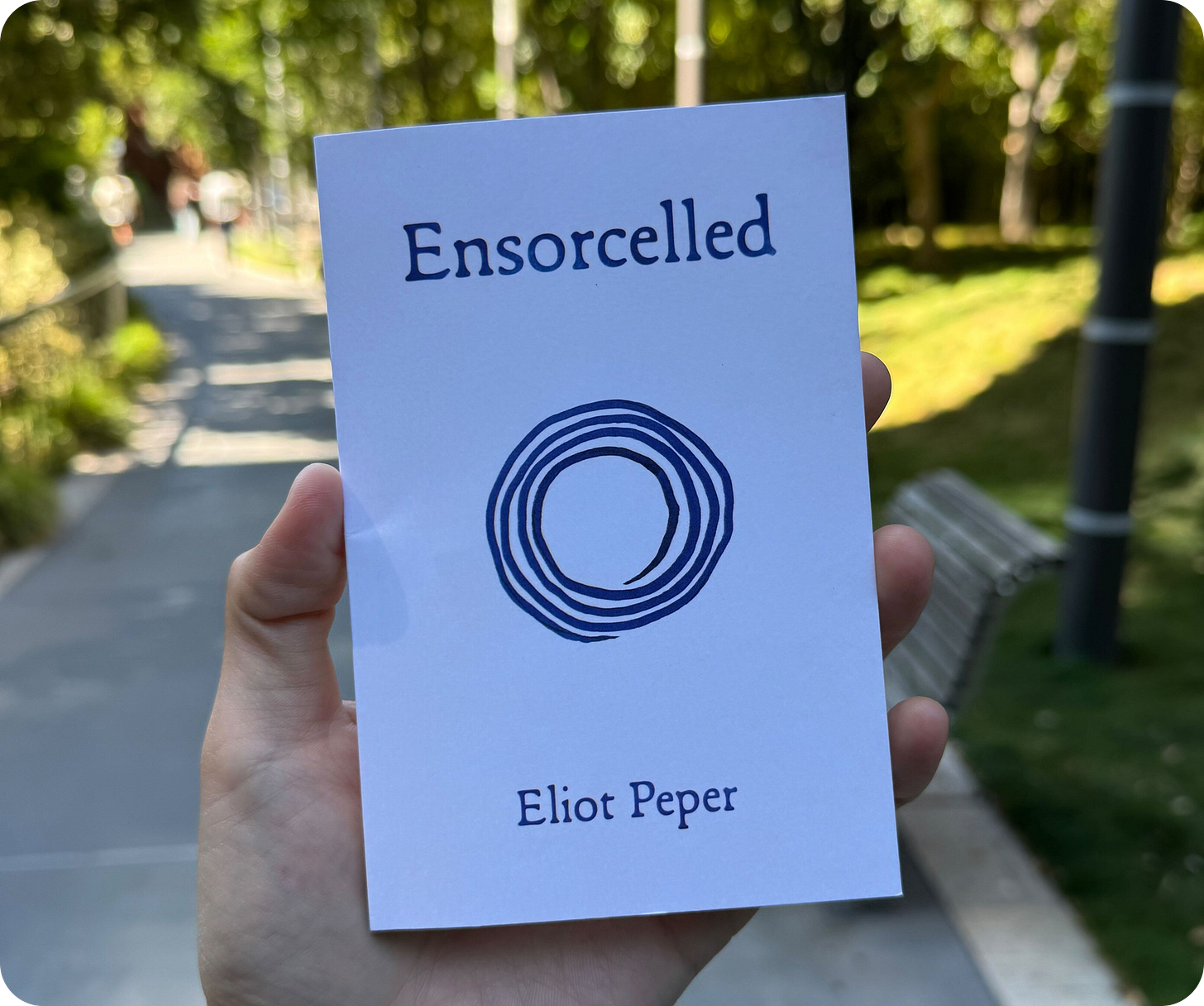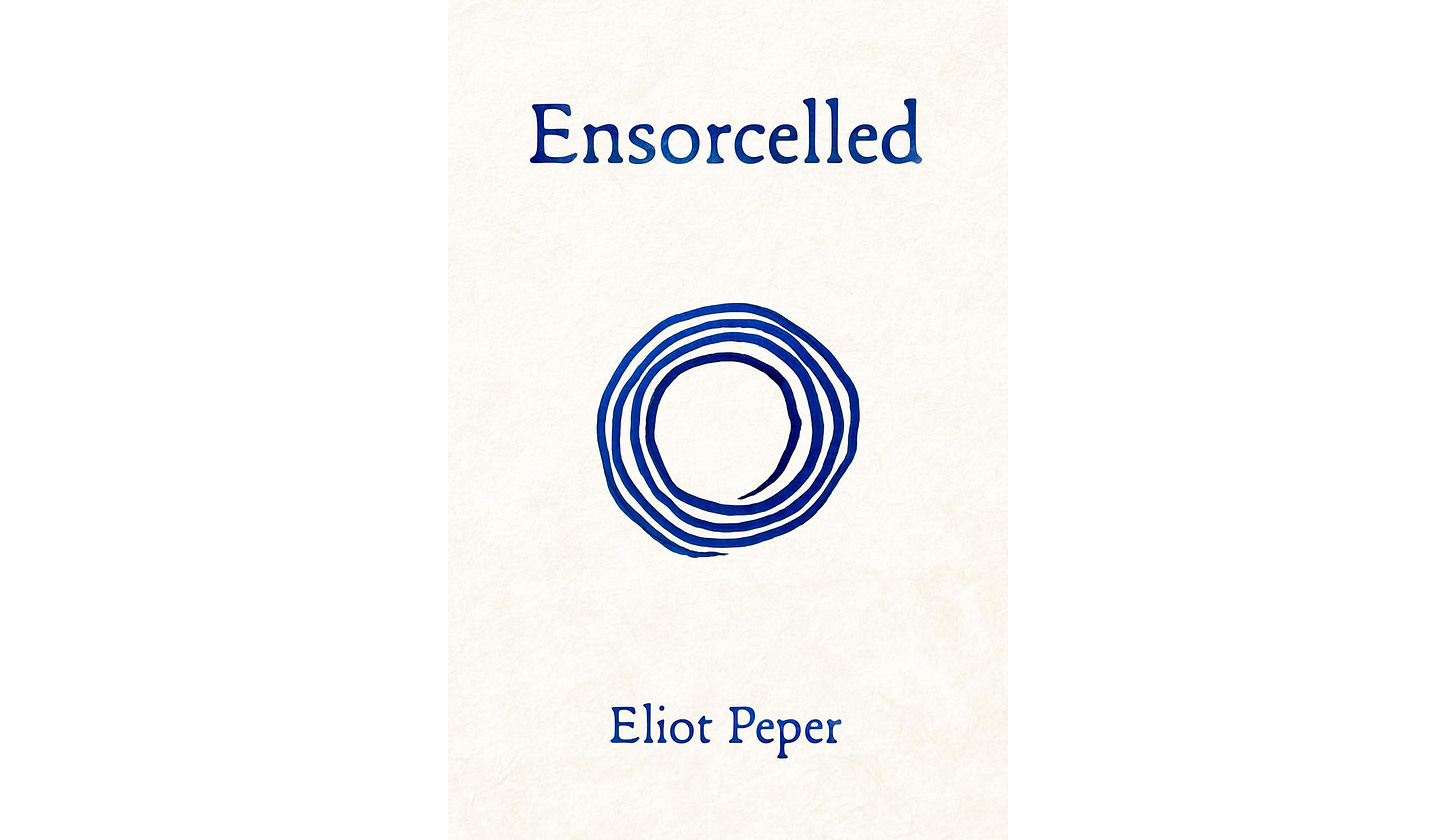Glasp Spotlight: Eliot Peper on Ensorcelled and the Power of Storytelling
Why fiction matters for leaders, creators, and anyone seeking fresh perspective.
Glasp’s note: At Glasp, we value the close personal relationships we’ve built with thinkers, creators, and doers who fuel curiosity and growth. This week, we spotlight Eliot Peper, a bestselling author whose speculative thrillers explore the collision of tech and culture. From entrepreneur to novelist, Eliot has built a career turning curiosity into compelling stories that resonate with readers worldwide. You might remember him from his Glasp Talk appearance, where he shared insights on curiosity, writing, and storytelling.
Eliot’s new book, “Ensorcelled, “ was published on October 8th, 2025, and we’re excited to collaborate again. We look forward to sharing his unique perspectives with our community and continuing to learn from his thought-provoking reflections.
If you want to reread or highlight this newsletter, save it to Glasp.
Questions
In our Glasp Talk in July 2024, you mentioned you were about 20% into a manuscript you hoped to publish in 2025. Is Ensorcelled that book?
Yes. Ensorcelled is the shortest book I’ve written and also took the longest to write. Whether you make software, movies, or any other creative product, you’ve probably experienced how concision may appear effortless, but is extremely difficult to achieve. Ensorcelled is tight. There isn’t a chapter, paragraph, sentence, or word out of place. I took the cleanest line to the heart of the story, which I hope will make readers’ hearts sing.
You’ve shared that after your son was born, you started a daily ritual of telling five-minute stories, and that one of those stories eventually grew into Ensorcelled. Could you tell us what the original story was like, and how it evolved into the book we now read?
Improvising fresh bedtime stories every night is surprisingly challenging. My son was only a few months old, so he wasn’t tracking the plot, but I wasn’t going to settle for anything less than giving him a full story arc. Doing so proved to be a great way to get narrative reps in. I could experiment with weird ideas and try to weave disparate threads together in satisfying ways. Over time, I approached the story that evolved into Ensorcelled from many different angles in many different iterations. Eventually, a few key themes and images took root in my imagination, and the only way to dislodge them was to write them into a book.
When you decided to actually publish it, what changes did you make along the way? Were there parts that were especially difficult to change, add, or cut?
Authors often describe two opposing ways of writing novels. Architects plan everything in advance and then execute on the outline, while gardeners write line-by-line, figuring out the story along the way. I do not subscribe to either philosophy. For me, writing is a cycle of having ideas that change as you realize them, generating yet more ideas. Making an idea real is an act of transformation that leaves nothing untouched. The fact that no plan survives contact with the enemy is precisely what keeps life and stories interesting.
Writing short daily stories sounds deceptively simple yet very hard. What was most challenging about it, and what did you discover or learn through the practice?
When I’m not writing, I’m surfing. There are entire industries built around selling equipment and coaching to improve your surfing, but the only thing that really matters is getting more time in the water. Want to get barreled? Hang ten? There’s no silver bullet. No magic pill. You need to learn to read and ride waves, which is a craft that can only be developed through consistent, intentional practice. Writing works the same way, and improvising stories for my son was a great way of spending more time in narrative water.
Out of all the stories from this ritual, why did you choose Ensorcelled to develop and publish?
People like to talk about note-taking, mind-mapping, and other ways of improving your memory, but I think we should pay more attention to the surprising power of forgetting. Forgetting is the filter that separates signal from noise. Creativity depends on taste, and even though you’re not conscious of it, taste is working on your behalf all the time by letting you forget everything that isn’t worth thinking about, giving you room to think about what’s actually important. I didn’t choose Ensorcelled from a slate of potential ideas. The ideas that became Ensorcelled chose me by refusing to be forgotten. They simply wouldn’t let me go until I acted on them.
You’ve primarily written science fiction, which often explores “what if” scenarios. How did your background in speculative fiction shape your creative process in writing a story rooted more in fantasy? What unique challenges and opportunities did you encounter?
Genres are useful because they tell readers what to expect from a book. If there’s a dragon on the cover, you won’t be surprised if a boy from a small village grows up to save the world from overwhelming evil with a ragtag group of friends. If it’s a mystery, you’ll be disappointed if you don’t find out who did it by the time you reach the end. As a reader, my favorite books don’t stick to one genre or another. Instead, they use whatever narrative devices serve the particular story they’re trying to tell, regardless of provenance, and abandon the rest. As an author, I write books I would want to read, which means that I tell stories that blend elements from different genres. I used narrative tools to write Ensorcelled that are traditionally deployed in fantasy, science fiction, adventure, bildungsroman, thriller, and memoir. This makes my books hard to market, but fun to read.
Looking back, what did you find most challenging, most enjoyable, and most surprising in the process of writing Ensorcelled compared to your previous novels?
Ensorcelled is a smaller, more personal, more intimate story than my other novels. It challenged me to flex new muscles as a writer, to develop stakes based more in character than high-concept, to open my heart as well as my mind. My dearest hope is that it does the same for readers.
Do you see yourself continuing to write stories beyond SF—perhaps more fantasy or even other genres?
I think of myself as a reader first and a writer second, so the next book I write will be the next book I want to read that doesn’t exist yet. This instinct, not genre or market factors, is how I make creative decisions. The best books are written about whatever the author is obsessed with because you can only write meaningfully about things you care deeply about. Sooner or later, a ramshackle squad of fresh ideas will hold my imagination hostage until I weave them into a story.
Does your son understand the stories you tell or write, and if so, how has his reaction influenced the way you shaped or expanded this book?
My son is two-and-a-half, and his favorite story of mine is when I pretend to roar like a tiger and chase him around the house. He’s definitely not reading any of my books yet. That said, seeing him grow deeply influenced Ensorcelled. His awe at the world around him made me painfully conscious of how much of my attention the digital world absorbs. I now spend a lot less time peering through screens at virtual wonders, and more time appreciating the physical wonders we too often take for granted. What it takes to rewild your attention became the primary theme of Ensorcelled.
Many in our audience are founders and executives. In your view, what role does reading fiction play for leaders, and how would you describe the appeal of Ensorcelled to them?
Effective leaders are extraordinary storytellers. You are bringing together a small group of uniquely talented people to do something that’s never been done before. You are embarking on a quest, and story is the only tool you have to recruit people to your cause. You need to show them why they should do this instead of all the other things they could be doing. You need to make them think. You need to make them feel. You need to make them care. If you want to tell better stories, you need to experience better stories, and many of the best stories are fiction, so fiction is an unreasonably valuable source of leverage for any leader. Why should you read Ensorcelled? Because it’s a damn good story that will make you think, make you feel, and make you care.
📚 Book: “Ensorcelled“
In Ensorcelled, Eliot Peper invites readers to rewild their attention through a story that mixes wonder, imagination, and hard choices. At just 90 pages, it’s a single-serving journey that lingers long after you finish.
📣 Community Updates by Glasp
🟥 Glasp Talk with Eliot Peper:
Glasp Talk features intimate interviews with luminaries, revealing their emotions, experiences, and stories. The guest, Eliot Peper, a bestselling author whose speculative thrillers explore the collision of tech and culture. From entrepreneur to novelist, Eliot has built a career turning curiosity into compelling stories that resonate with readers worldwide.✨ Want a concise summary before diving in? Install the YouTube Summary with ChatGPT extension by Glasp for instant video summaries!
Would you like to take Glasp on the go?
With the Glasp mobile app, you can highlight and organize your favorite content anytime, anywhere. Stay productive on the move and never miss an insightful quote.
Partner With Glasp
We currently offer newsletter sponsorships. If you have a product, event, or service you’d like to share with our community of learning enthusiasts, sponsor an edition of our newsletter to reach engaged readers.







Thank you, Eliot, for your amazing answers. Every time I talk to a writer, I find insightful quotes that let me think further.
While reading Ensorcelled, I found myself wondering how the protagonist’s adventure would conclude and what the (imaginary) animals that appeared throughout the story symbolized. Immersed in the narrative, I found myself pondering its deeper meanings. After finishing the book, I was left with a sense of lightness and a floating feeling, along with a satisfying understanding of the connections among the characters. It also made me reflect on what insights—perhaps ones I haven’t yet realized—I could gain from this story.
So inspired by Eliot’s journey from bedtime stories to Ensorcelled! It beautifully captures how storytelling connects us as creators, parents, and leaders. Grateful to have him as part of the Glasp Community and to keep learning from his approach to creativity and focus!